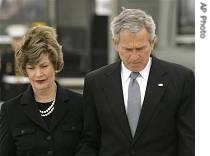-
(单词翻译:双击或拖选)
Washington
19 April 2007
Mental health counselors1 have been helping2 students, faculty3 members and some families deal with their feelings in the aftermath of the tragic4 shootings at Virginia Tech Monday (April 16th) in Blacksburg, Virginia. Medical experts say a few may have difficulty adjusting to normalcy months after the shootings. VOA's Melinda Smith has more about the longterm effects of what is called Post Traumatic Stress Disorder5.

Jay and Debbie Wilkins came to the Virginia Tech campus to comfort their two daughters, as much as comfort themselves. "I felt very much like they needed a hug, but I felt like I too needed a hug. I needed to get my hands on my girls and know that they're okay."
The Wilkins family had seen the frightening pictures on television. A college friend was injured in the mass shootings.
Their daughter Erin said she had been unable to sleep after the day's horrific events. Her dormitory window faced the part of the campus where many of the 32 victims died. "It's not just people I don't know and unnamed faces. It's people I know and I've been with for four years."
Thousands of her college friends and faculty members also sought ways of understanding why such a horrible thing could happen to them.
 |
| Laura and George Bush depart Andrews Air Force base in route to Virginia Tech convocation |
Mr. Bush told them he understood that Monday may well turn out to be the worst day of their lives.
Surprisingly, however, psychiatrist6 James Griffith of George Washington University says most of those on the Virginia Tech campus that day will recover emotionally. Sharing their experiences with others who also lived through it is part of he calls "psychological first aid." "As awful as it is, human beings are well-built to get through tragedy to recover. Most people are."
Having difficulty sleeping or concentrating, feeling alienated7 from others, getting angry easily, and guilt8 -- because you survived and others did not -- are recognizable symptoms of Post Traumatic Stress Disorder. For most people, normal adjustment after such a traumatic event takes about eight weeks. But for those who continue to have symptoms of Post-Traumatic Stress into the second or third month, Dr. Griffith says they should seek treatment and possibly medication.
"We know that what does render a person vulnerable to illness -- to really developing Post Traumatic Stress Disorder -- is that the brain is held in too high a state of alarm for too long. So in the aftermath of a tragedy like this is what people most need is as quickly a felt sense of safety and security."
For some of the students and faculty, there may be one positive outcome from a life changing event like the tragedy at Virginia Tech.
Psychiatrists9 call it 'post traumatic growth.' Those who have experienced it say a crisis often gives them a new appreciation10 for life, and something they can draw on as a source for strength and spiritual development.
 收听单词发音
收听单词发音
1
counselors

|
|
| n.顾问( counselor的名词复数 );律师;(使馆等的)参赞;(协助学生解决问题的)指导老师 | |
参考例句: |
|
|
|
2
helping

|
|
| n.食物的一份&adj.帮助人的,辅助的 | |
参考例句: |
|
|
|
3
faculty

|
|
| n.才能;学院,系;(学院或系的)全体教学人员 | |
参考例句: |
|
|
|
4
tragic

|
|
| adj.悲剧的,悲剧性的,悲惨的 | |
参考例句: |
|
|
|
5
disorder

|
|
| n.紊乱,混乱;骚动,骚乱;疾病,失调 | |
参考例句: |
|
|
|
6
psychiatrist

|
|
| n.精神病专家;精神病医师 | |
参考例句: |
|
|
|
7
alienated

|
|
| adj.感到孤独的,不合群的v.使疏远( alienate的过去式和过去分词 );使不友好;转让;让渡(财产等) | |
参考例句: |
|
|
|
8
guilt

|
|
| n.犯罪;内疚;过失,罪责 | |
参考例句: |
|
|
|
9
psychiatrists

|
|
| n.精神病专家,精神病医生( psychiatrist的名词复数 ) | |
参考例句: |
|
|
|
10
appreciation

|
|
| n.评价;欣赏;感谢;领会,理解;价格上涨 | |
参考例句: |
|
|
|















